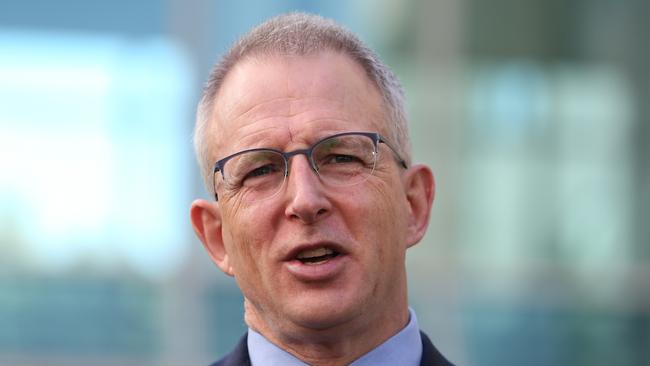Big tech must pay media: Paul Fletcher
The Communications Minister has backed a decision by France’s competition regulator in favour of publishers.

Communications Minister Paul Fletcher says a decision by France’s competition regulator to order Google to negotiate with publishers for their content is the right one, and says he’s confident the tech giants will pay publishers in Australia.
“The fact that the French competition regulator is going through a similar process just tends to underline the importance, from a competition perspective, that the digital platforms properly pay for content that’s been generated by media companies that costs money to produce,” Mr Fletcher said.
“As the ACCC said in their final report, the social media platforms are unavoidable commercial partners for the big media businesses, and there needs to be a way for there to be fair payment.”
News Corp executive Michael Miller and more recently ACCC chairman Rod Sims say they’re sceptical the tech giants have been acting in good faith during ongoing negotiations with publishers, and Mr Fletcher said it was the government’s expectation that the tech giants would play ball.
“We’ve been pretty clear on what our expectations are,” he said. “That’s why Rod Sims is in charge of leading this work, he’s the chair of our competition regulator and the ACCC has a well-established track record in imposing codes in situations where there’s an imbalance in bargaining power between two sets of parties.
“That’s exactly what we want the ACCC to be doing here.”
Late last week France’s national competition regulator imposed an order on Google to negotiate payments with media companies following a successful campaign by French publishers.
Three of France’s leading media organisations filed a complaint against Google in November last year claiming the tech giant’s practices constituted an “abuse of dominance and abuse of economic dependence”.
Google refused to provide publishers with information on search algorithms to calculate payments to media organisations. French authorities found that by refusing to pay publishers without taking into consideration their individual circumstances it may have been guilty of discriminatory practices.
It also found media companies had “no choice” other than to comply with Google’s policy of not paying for content, under a threat of display downgrading, which would result in a significant loss of traffic and income for publishers. The competition authority found Google’s behaviour constituted a “serious and immediate effect on the press sector” especially given the “major crisis” in media.
COVID-19 has wreaked havoc on media companies, forcing some small newspapers to close. Director of struggling Seven West Media, Ryan Stokes, told The Australian the ACCC needed to be able to enforce an agreement.
“Seven West has and we share a view that the current landscape is not very equitable and certainly support the ACCC’s push to encourage the digital giants who still take the majority of the ad revenue to actually pay for the content that they use.”
Mr Fletcher said the pandemic’s financial stresses made a deal more important.
“The internet, of course, has brought many benefits, but what the government has accepted is that the fact there’s new technology doesn’t mean the basic principles of fair competition go out the window,” he said. “We need to see (Google and Facebook) negotiating fairly with the people they’re doing business with.
“They’re doing business with Australian media businesses, they’re using their content, and there needs to be a proper and fair remuneration for use of that content. We expect the digital platforms to take this very seriously.”
Mr Fletcher has also been charged with keeping Australia’s broadband infrastructure running as the country increasingly works and studies from home, and he said there had been a 70 to 80 per cent increase in daytime internet traffic levels since February 28.
A decision to ask the streaming companies, including Netflix, Stan and Foxtel, to reduce their bit rates had resulted in a 4 per cent traffic reduction on the NBN, freeing up the network for people to work and study. “The streaming services agreed to reduce their peak load by 25 per cent, and most viewers will not even notice that difference,” he said. “It’s still a very high-quality, high-resolution service. But it’s made a significant difference.
“At this stage the network is holding up well, and of course there are localised bottlenecks, but NBN is identifying where those are and whether there’s a need to provide additional capacity.”



To join the conversation, please log in. Don't have an account? Register
Join the conversation, you are commenting as Logout